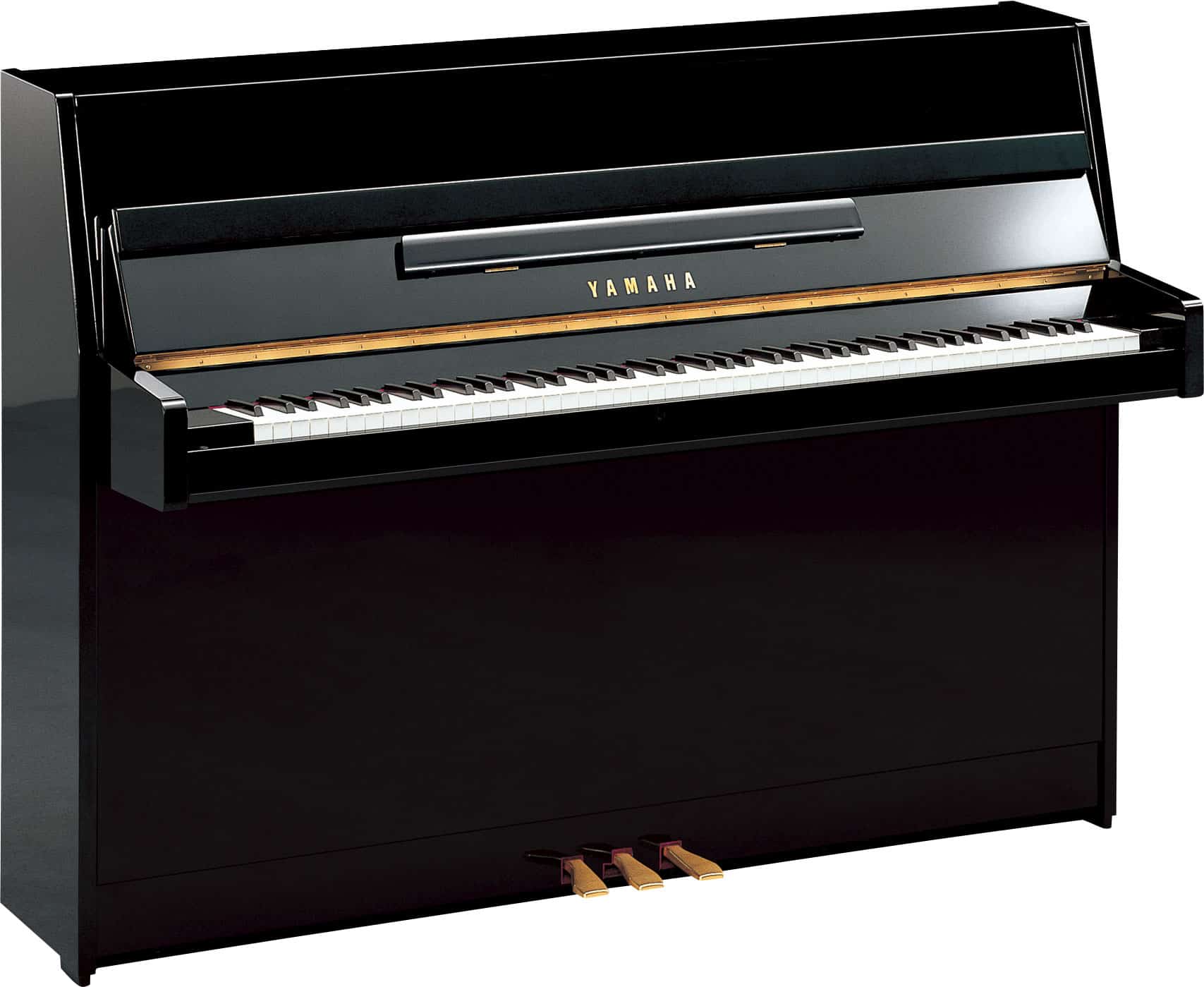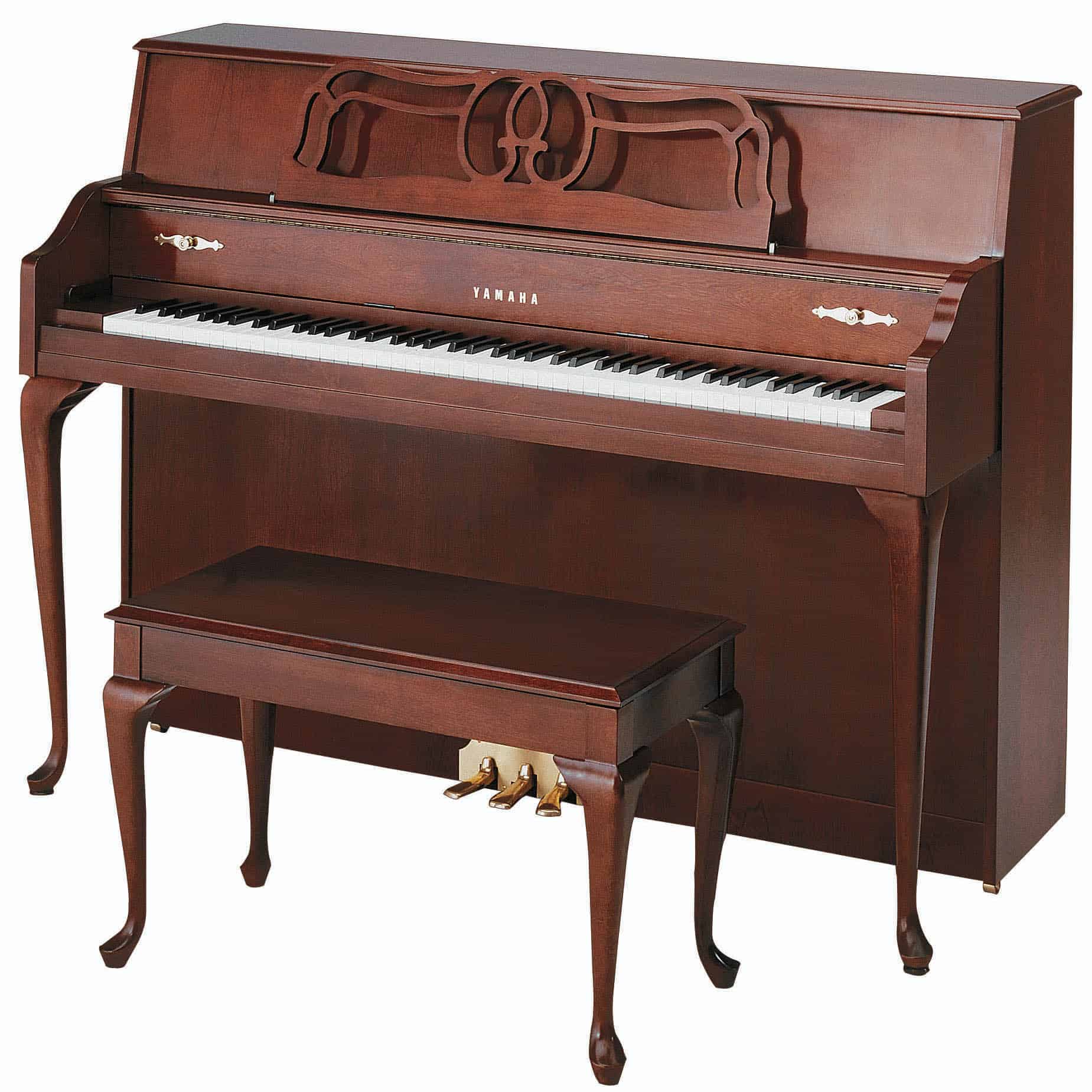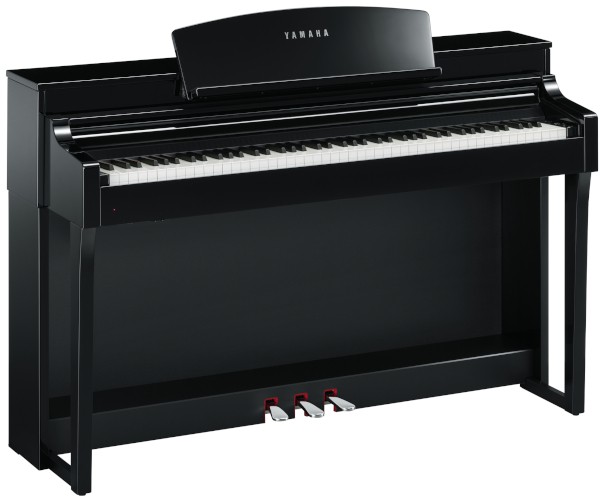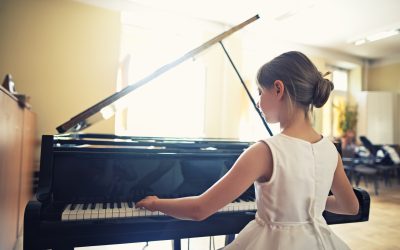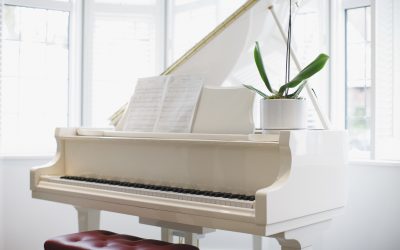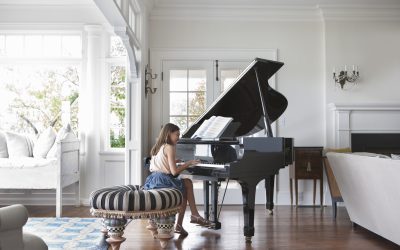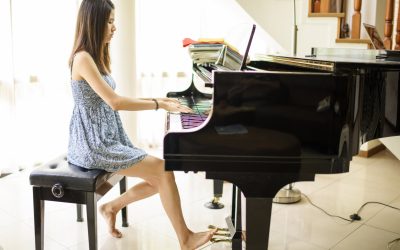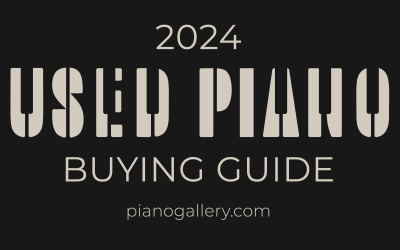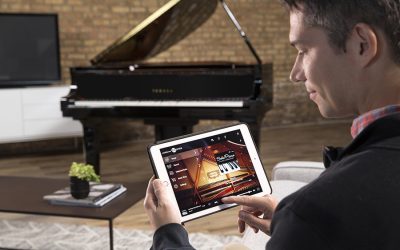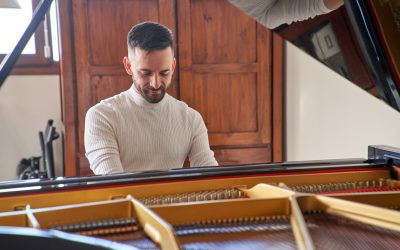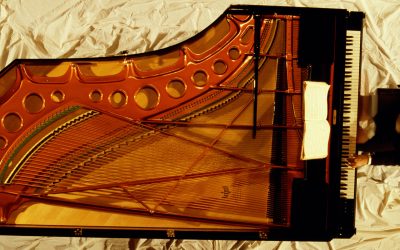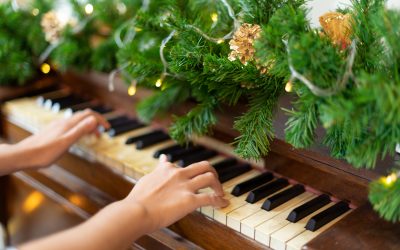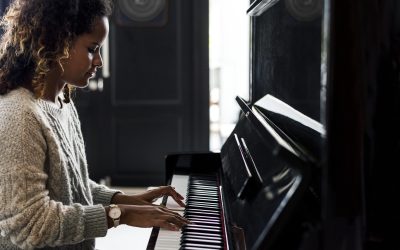Best Beginner Pianos: A Complete Guide for 2024
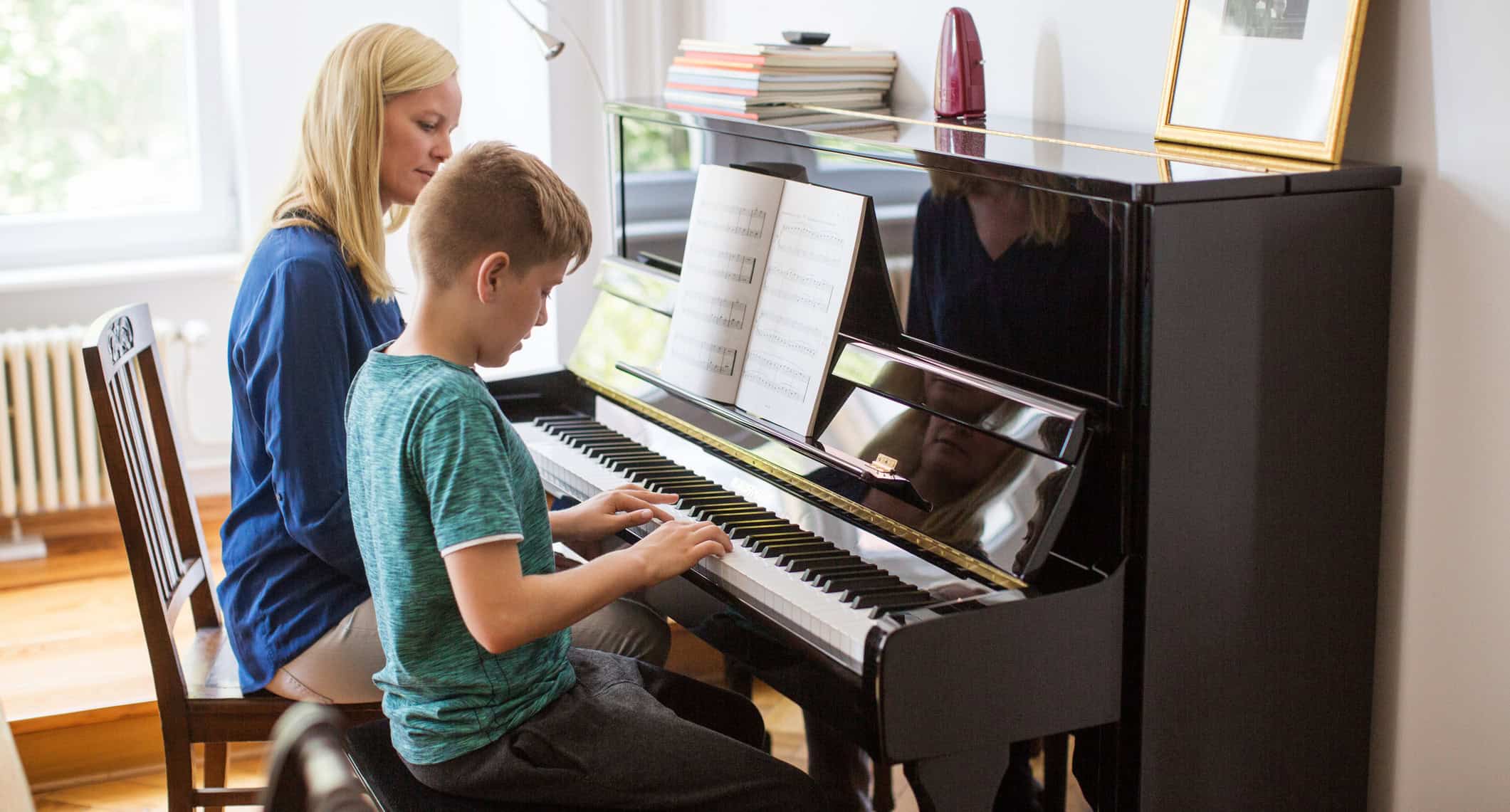
If you’re looking to add a piano to your home for yourself or family members to learn to play on, then get ready for an exciting journey. Playing the piano is a lifelong passion for most players and brings music and joy to the home, as well as academic and emotional benefits for younger players. However, if you have not owned a piano previously (or if it’s been a while), you may be wondering what type of piano is best for a beginner, how much to expect to spend, and whether to choose an inexpensive keyboard as a starting point.
In this article, we take advice derived from our piano experts as well as seasoned piano teachers to provide some of the most commonly asked –questions about buying a piano for beginners.
QUICK LINKS:
Best Acoustic Beginner Piano 2024
Most Popular Used Beginner Piano 2024
Best Used Grand Piano for Beginners 2024
Best All-Around Piano for Beginners 2024
How Much Should a Beginner Pay for a Piano?
What to Look for in a Beginner Piano
Is it Better to Learn Piano on a Piano or Keyboard?
Is it Better to Learn Piano or Keyboard First?
Is it ok to Learn Piano on a Small Keyboard?
Is it Better to Learn Piano Online or In-Person?
Which Pianos are Best for Beginners 2024?
The best pianos for beginners are well-made, quality pianos at a lower, budget-friendly price point. Most beginners are reticent to spend tens of thousands of dollars on a concert grand piano because, well, they simply won’t use the full performance abilities of these pianos any time soon—that is, unless the piano is a player piano, in which case the beginner will get the full value of the remarkable sound of a professional grand piano as well as a great piano to learn on all at the same time.
That said, it’s more common for beginners to choose a less expensive but highly functional piano to learn on. Below, we share the best pianos for beginners in 2024 based on price, style, and features.
Best Acoustic Beginner Piano 2024: Yamaha B1
The Yamaha B1 is a great beginner piano that upholds the quality, performance, and workmanship of Yamaha at an affordable price. Starting at $5,399, the piano isn’t necessarily a “budget” option, but since it holds its value exceptionally well, it can be resold or traded in down the line when you choose to upgrade or upsize. The B1 has a relatively short soundboard, meaning its sound and resonance won’t hold up to a Yamaha U3 or, better, a C3X, but for a beginner who won’t be playing Chopin any time soon, the sound quality is great for the price.
Pros: Holds value well, good sound quality.
Cons: Shorter soundboard means less resonance than higher Yamaha models, more expensive investment than lower-quality pianos.
Most Popular Used Beginner Piano 2024: Used Yamaha M500
If you’re leaning toward a used piano, choosing something that is a Yamaha, Steinway & Sons, or Bösendorfer ensures a higher quality of manufacturing and will therefore have held its value better than smaller, more cheaply made brands. Used Yamaha M500s are a popular option for used beginner pianos because of their lower price-point (usually between $3,500 – $5,000) and decorative style. These pianos are no longer manufactured by Yamaha but were popular in the late 1990’s and early 2000’s, which means they’re often easier to find than other used Yamaha models.
Pros: Yamaha quality and workmanship, easier to find than other used Yamaha pianos, holds value well.
Cons: Lesser sound quality than the Yamaha U series due to a smaller soundboard, not available new.
Best Used Grand Piano for Beginners 2024: Yamaha G2
In terms of grand pianos, most beginners will opt for a used grand piano for cost-savings purposes while ensuring they or their children enjoy playing well enough to make a new piano purchase worthwhile down the road. (If you’re shopping for a new grand piano, check out our grand piano buying guide here).
The advice for purchasing a used grand piano are the same as for purchasing a used upright piano: Look for a high-quality brand such as Yamaha, Bösendorfer, or Steinway & Sons. These pianos hold their value and quality over longer periods of time than smaller, more cheaply made pianos. It’s also wise to purchase from a certified seller to ensure you’re getting accurate, reliable information about the quality, age, and current condition of the piano.
Our choice for the best used grand piano for beginners is the Yamaha GC2, if you can find it. This piano is manufactured by Yamaha, which is, of course, one of the best and most well-recognized piano makers in the world. This means you can expect the used grand piano to hold its value for 50-80 years, as long as it’s well-maintained. The Yamaha GC2 is 5’8”, making it a proper grand piano (not a baby grand piano), and therefore has a long soundboard, excellent tone quality and resonance, and optimal performance touch and feel. It’s high-quality manufacturing also makes it a showpiece in the home.
While GC2s are nearly $30,000 new, you can often find used GC2s from reputed retailers for prices closer to $6,000 – $15,000.
Pros: Great quality piano, holds value over time, beautiful traditional grand piano aesthetic, unmatched sound and performance.
Cons: Can be pricey; make sure to use a reputable piano mover to avoid damaging the piano in transit.
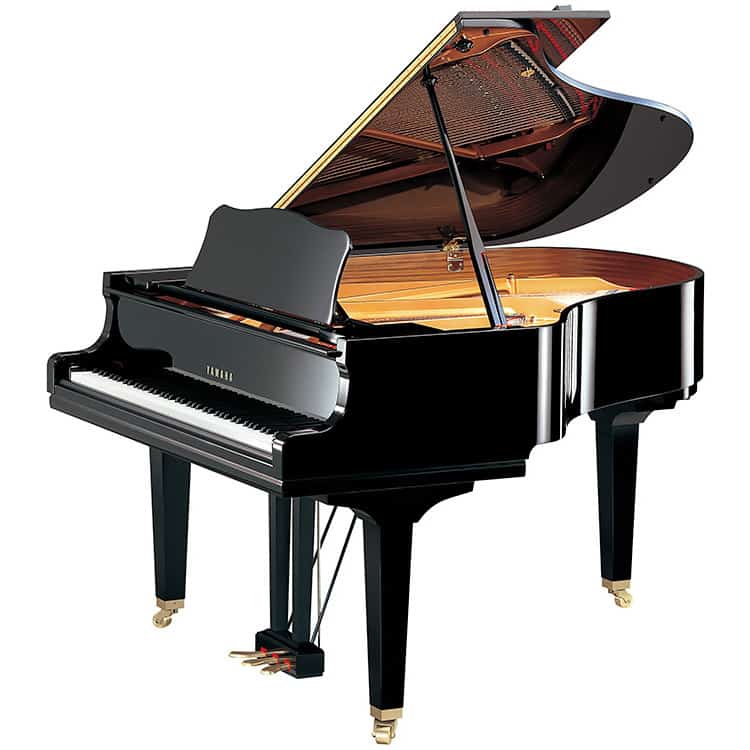
Best All-Around Piano for Beginners 2024: CSP-150
The CSP-150 is widely considered one of the best pianos for beginners. The digital piano has a full 88-key keyboard, weighted keys for an authentic acoustic piano touch, piano sounds sampled from two of the best performance grand pianos in the industry, as well as quality voices from hundreds of other instruments. This isn’t the only place where the CSP-150 shines, however. It is also the best beginner piano because it has advanced teaching technology, including tablet compatibility with a large library of Yamaha tools, games, and resources for learning to play the piano. The Yamaha CSP-150 Clavinova also has a play-by-light keyboard that guides the player by lighting up each note in their favorite songs.
The price of a CSP-150 starts around $4,000 (but is often available on sale for closer to $3,800) and holds its value well if you decide to upgrade within 5-7 years. Clavinovas are high quality digital pianos, which means even if you don’t decide to upgrade, you’ll be able to expect excellent quality from this instrument for upwards of 20 years.
As far as cons go, the list is limited for this great beginner digital piano. For those who enjoy the aesthetic of a traditional piano, the CSP-150 won’t have as much “wow” factor, especially since it’s only available in two cabinet colors: matte black or polished black. However,
Pros: Intuitive simplicity means you can start playing without getting overwhelmed by too many features; offers several learning tools including play-by-light and “Audio to Score,” great price; excellent piano sound, touch, and feel.
Cons: Lacks cabinet options and authentic acoustic aesthetic.
How Much Should a Beginner Pay for a Piano?
Buyers should expect to pay between $3,000 – $6,000 for a good quality beginner piano. This range allows for high-quality performance and manufacturing as well as critical features such as 88 keys and a sustain pedal, but without the high price tags of advanced pianos.
If a pianist is looking to buy an affordable piano, they can consider tips such as choosing a digital piano over an acoustic piano (make sure to find a digital piano with weighted keys), opting for a used piano, or seeking financing options.
What to Look for in a Beginner Piano
For a beginner piano player, it’s important to look for a piano that will support your learning. This means you want a piano or digital piano that has essential features and sound quality for a beneficial learning experience. You should look for the following in a beginner piano:
- Weighted Keys. One of the critical things to look for in a beginner piano is weighted keys. Acoustic pianos naturally have weighted keys since it takes a mechanical action to press a key to trigger a hammer that hits the strings. However, many digital keyboards to not have weighted keys. Learning to play on a keyboard without weighted keys prevents you from gaining the finger strength and control that is essential for playing piano.
- Sustain Pedal. While you don’t necessarily need all three pedals as present on an acoustic piano for a beginner piano, you should at least have a sustain pedal. The sustain pedal is introduced in late beginner to early intermediate piano playing and is used widely in intermediate to advanced piano playing. If you choose a beginner piano without a sustain pedal, you’ll quickly find yourself upgrading in part for that feature.
- Full Keyboard. While you won’t be using all 88 keys anytime soon, a full keyboard is important for the theory parts of learning to play the piano.
- Good Sound Quality. When purchasing a beginner piano, you’ll want to look for an instrument with good sound quality. This is less about the practicality of playing a piano and more about the artistry and enjoyment of it. If your beginner piano has poor quality sound, you’ll be less likely to enjoy playing it, leading to a higher probability that you’ll give up or lose interest. Instead, start with a piano that plays well so you can hear and feel the sound potential as you learn increasingly advanced techniques in playing.
- Learning Tools (Optional). If you choose a digital piano for your first beginner piano, you may want to consider a digital piano with learning tools, especially if the beginner student is a child. Many digital pianos, such as Yamaha Clavinovas, interact with tablets or smartphones to provide exceptional learning experiences. Even without these applications, younger beginner students may take more interest if they’re able to utilize features such as different instrument sounds, background rhythms, recording and playback, and more.
Is it Better to Learn Piano on a Piano or Keyboard?
It is better to learn piano on an acoustic piano or a digital piano with weighted keys. This is because the finger strength and manipulation required for playing a piano are developed through playing on keys that have some mechanical resistance and that are the standard sized. Keyboard keys, conversely, typically aren’t weighted and may have differently sized keys than traditional pianos.
Some keyboard retailers will argue that you can use a keyboard to learn to play the piano as keyboards are typically less expensive and require many of the same hand movements as a traditional piano. However, without the weighted keys, a beginner’s fingers are learning the movements but not the pressure or strength required to depress keys. Think of it as learning to drive a car by pressing imaginary pedals with your foot instead of the typical weighted pedals. The sensation of depressing pedals in a real car requires different movement, feel, and strength than imaginary pedals with no resistance, especially if you’re learning to drive a manual.
This means the beginner piano player will not gain the finger strength necessary for piano playing, nor will they learn the nuances of depressing the keys with different pressure to create changes in expression, such as volume, resonance, and smoothness. For instance, pianissimo, piano forte, forte, legato, and staccato, etc. are all concepts learned in beginning piano lessons).
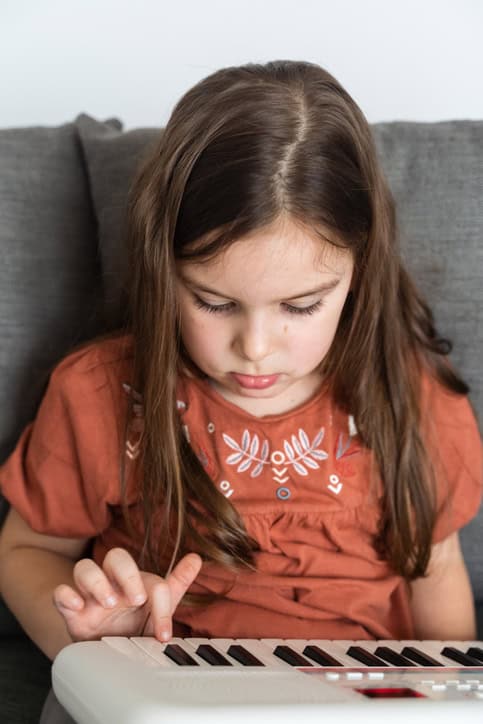
Is it Better to Learn Piano or Keyboard First?
It is typically best to learn to play the piano first before learning to play the keyboard as opposed to learning to play the keyboard first. This is because the skills and strength for playing the piano will transfer seamlessly to playing the keyboard, whereas a keyboard lacks the weight and feel of playing an acoustic piano, making keyboarding skills less transferrable to playing an acoustic piano.
In addition, a keyboard will have additional electronic features, such as voicing, polyphony, effects, midi compatibility, rhythms, fills, and more. Playing using these features can get complicated—fast. Most music teachers agree that teaching the basics of acoustic piano playing first, then learning additional electronic capabilities through a keyboard after, is a more logical learning progression than the reverse.
Is it Okay to Learn Piano on a Small Keyboard?
Learning piano on a small keyboard can be detrimental to a beginner because students will not develop hand strength or proper coordination and will miss out on theory development. Because of this, it is recommended that beginning students learn to play on an 88-key piano or digital piano with weighted keys.
While keyboard sellers will disagree, almost all expert piano instructors will attest that a full-keyboard and weighted keys are crucial for beginning piano lessons. That’s because playing the piano is all about developing muscle memory. Without the resistance of weighted keys, beginning students are not developing their muscles properly for playing real acoustic pianos. This throws off their timing, finger strength, and coordination.
Another reason beginners shouldn’t learn to play piano on a small keyboard is because keyboard keys do not have responsiveness to touch. In other words, if you have the keyboard set to a certain volume, the key will play one sound and one sound only no matter how firmly or softly you depress it. In contrast, acoustic pianos can play a single key softly (pianissimo) or loudly (fortissimo), as well as smoothly (legato) or abruptly (staccato). These concepts are taught early in beginning piano lessons, which means those students learning on a small keyboard miss out on the critical theory.
Is it Better to Learn Piano Online or In-Person?
In most cases, it is better for beginning piano players to learn piano in-person than from online classes. This is because playing the piano is based on muscle memory. Playing from a pre-recorded class means you’re less likely to maintain proper posture and wrist/finger placement, developing bad habits that are difficult to break in the long run.
If a student is intent on learning to play piano online, it is suggested that they start first with an in-person piano teacher while they develop proper posture and hand movement, switching to online classes only after they have the mechanics down. If cost is the reason for choosing online lessons over in-person, consider group lessons for beginners. Another option is to use a live instructor that provides classes over the web, such as with Zoom. This allows you to learn to play in the comfort of your own home, typically with a discount, while still receiving the attention to detail required in early stages to develop the mechanics of playing properly.
Final Thoughts
In the end, learning to play the piano on any piano and in any way is better than not learning at all! Piano playing is an endless source of passion and joy, so if the suggestions above feel constraining, do what you can and enjoy the journey. We wish you luck!
About the Author
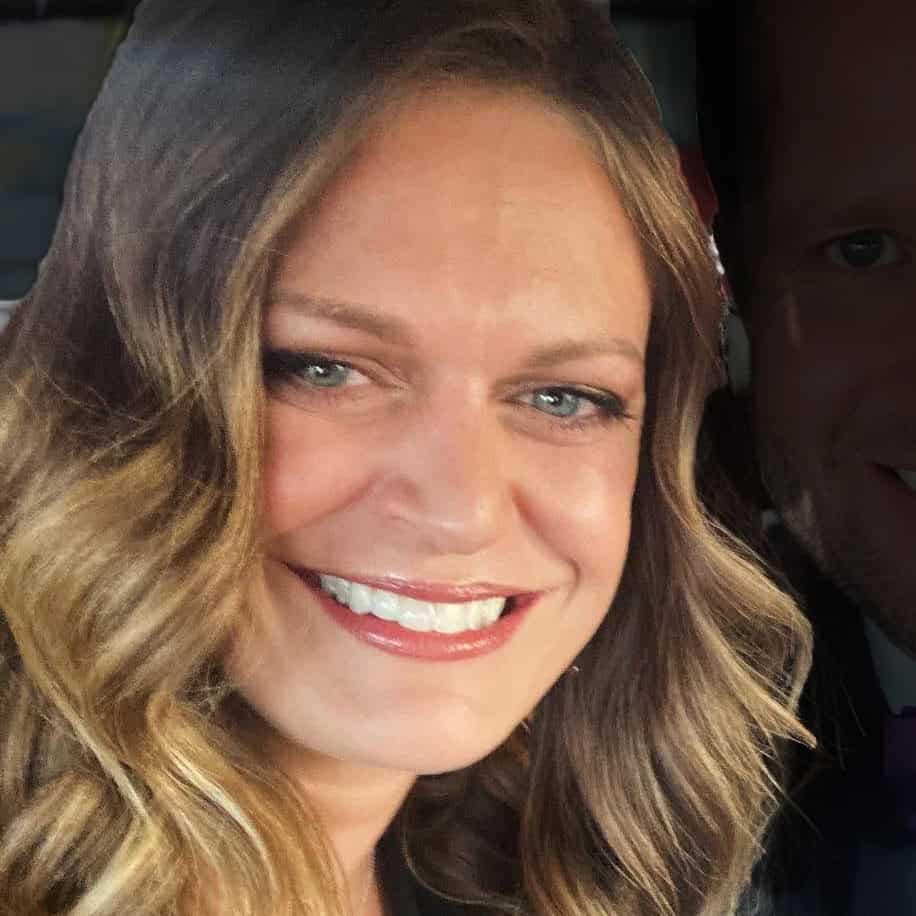
Mikelle Despain
Piano Insights Author
Mikelle is a classically trained pianist and former piano teacher who has been in the piano retail industry for over 20 years. Her dream piano is a Yamaha S5X. She currently provides expert insights for Piano Gallery to share information and advice for buying, playing, and enjoying the piano. When she's not writing or playing piano, she's spending time with her four kids, tending her vegetable garden, boondock camping, hiking, or cooking overly-extravagant meals for friends.
Further Reading...
Baby Grand Piano Buying Guide
Baby Grand Piano Buying Guide Baby grand pianos are a smaller version of a traditional grand piano. They are typically 5’ to 5' 6” in length (from the tail to the keyboard). High-quality baby grand pianos, such as the popular Yamaha C1X hold their value extremely...
2024 Guide: Best Grand Pianos For Your Family
© Piano Gallery 2024“When I had nothing else, I had my mother and the piano. And you know what? They were all I needed.” Alicia Keys Buying a grand piano for your family is no casual matter. People develop deep connections with musical instruments that often start at...
What is the Difference Between a Baby Grand Piano and Grand Piano?
Grand pianos and baby grand pianos are the epitome of a classic icon in music. With their elegant curves, propped lids, and exposed strings and soundboard, their beauty is often one of the first things people think of when considering a grand or baby grand piano. In...
How Much Does a Baby Grand Piano Cost?
A baby grand piano is often chosen by musicians and enthusiasts not only for its elegant aesthetic, which enhances any room, but also for its rich, resonant sound quality that is superior to that of smaller pianos. Despite being more compact than a concert grand, a...
How Much Does a Piano Cost?
The cost of a piano varies widely based on its type, brand, condition (new or used), and the intricacies of craftsmanship involved in its manufacturing. In this article, our piano experts share price ranges for the main types of pianos, explain what impacts the...
Tips for Buying a Used Piano
2024 Used Piano Buying Guide Pianos are well-regarded as holding their value well, making used pianos a popular purchase, especially for new piano buyers or those looking to upgrade their pianos without a significant financial investment. Many pianos can hold their...
Complete Yamaha Disklavier Guide for 2024
In music, innovation often means striking a balance between preserving traditional craftsmanship and embracing modern technology. Yamaha, world renowned for its instruments, has mastered this balance with its Disklavier pianos, which combine a rich, resonant, classic...
Buying a Piano for Christmas? 12 Ideas for Surprising your Family with the Piano
A piano is one of the most memorable Christmas gifts your family can receive. Unlike some gifts, it's not played with for a few weeks then forgotten, it doesn't disappear into a closet until spring cleaning, it isn't quickly replaced by a new obsession or hobby, and...
10 Resolutions for Piano Players in 2024
For many of us, New Year's resolutions are heavy with responsibility, usually including health and exercise, work and finances, and even family relationships. One thing often overlooked in the resolution process is fun hobbies or passions such as playing the piano....
How a Grand Piano Works
If you're a piano player, can feel the magic of a grand piano as you play, your fingers moving across the keyboard with nuanced strokes that bring beautiful music that resounds through the instrument. Behind its elegant exterior lies a complex mechanism that...
A Guide to Buying a Piano as a Family Christmas Gift
The holiday season is a time of joy, togetherness, and creating lasting memories with our loved ones. If you're searching for a gift that will bring joy into your home, consider the timeless and elegant gift of a piano. How to Buy a Piano as a Gift Even though the...
Largest Collection of Quotes About Playing the Piano
When you're a pianist, playing the piano isn't just a hobby, it's a lifestyle. Even causal players feel a deep, meaningful connection to the instrument. In this article, we share some of our favorite quotes about playing the piano, because #IYKYK Favorite Piano Quotes...
